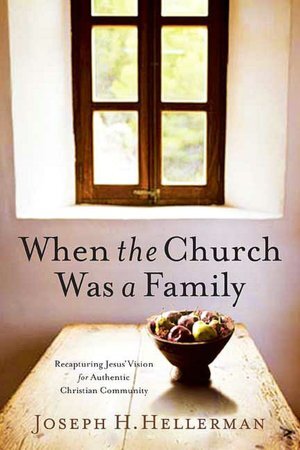Joseph H. Hellerman, When the Church Was a Family: Recapturing Jesus’ Vision for Authentic Christian Community. B and H Academic, 2009.
Referenced in: Ecclesiologies
LifeandLeadership.com Summary
Theology of Mission and Ministry.
Summary: When the Church Was a Family is an excellent example of contextualized ecclesiology, exploring God’s intent for the church into a specific cultural setting, in our case Western society generally and North America particularly. It is a substantive, well-written development of the need for the church to recover its identity as a committed community over against the isolationist/individualist tendencies of contemporary culture. Hellerman is a professor of New Testament, and solidly interacts with recognized scholars on the subject such as Robert Banks, Gordon Fee, Bruce Malina, Ben Witherington, N.T. Wright, and others. He is also a practicing churchman, and writes in a style that is accessible to those who are less theologically trained. It comes highly recommended by both emergent types such as Dan Kimball and Eddie Gibbs and conservative apologists such as J. P. Moreland.
Hellerman presents the central focus of his book:
The world in which Jesus and his followers lived was a strong group culture in which the health of the group – not the needs of the individual – received first priority. It is hardly accidental that the New Testament writers chose the concept of family as the central social metaphor to describe the kind of interpersonal relationships that were to characterize those early Chrisitan communities. There is, in fact, no better way to come to grips with the spiritual and relational povery of American individualism than to compare our way of doing things with the strong-group, surrogate family relations of early Christianity. (6)
Refreshingly, he targets both traditional/established and postmodern/emerging churches who yearn for a strong(er) sense of community among believers. He respects yet challenges both. He addresses the spiritual bankruptcy of consumer Christianity and the “let us meet your needs” approach of the traditional church, and warns that his approach is an “acute paradigm shift” that is “much more than a slight course correction in our weekly programming or the addition of another line item to the church budget.” (9) On the other hand, he warns that “for all the preoccupation in the emerging church with culture and cultural studies, it remains the case that certain aspects of postmodernism – religious pluralism, tolerance, and moral relativism – have the potential to hijack this wonderfully promising expression of renewal in Western Christianity.” (11)
Hellerman blends scholarship and practice into his proposal, looking at the backgrounds of family in the New Testament world, and the reflections of this in Jesus’ community, the churches of Paul, and the church in the Roman world. He also discusses salvation as a community-creating event, and how the committed community does life and leadership, even to the point of how being community affects the way we make decisions.
A good way to read this text is to look at the conclusion first. It summarizes the book and serves as foretaste of the overall content.
From the Publisher
Spiritual formation occurs primarily in the context of community. But as the modern cultural norm of what social scientists call “radical American individualism” extends itself, many Christians grow lax in their relational accountability to the church. Faith threatens to become an “I” not “us,” a “my God” not “our God” concern.
When the Church Was a Family calls believers back to the wisdom of the first century, examining the early Christian church from a sociohistorical perspective and applying the findings to the evangelical church in America today. With confidence, author Joseph Hellerman writes intentionally to traditional church leaders and emerging church visionaries alike, believing what is detailed here about Jesus’ original vision for authentic Christian community will deeply satisfy the relational longings of both audiences.
About the Author
Joseph H. Hellerman is professor of New Testament at Biola University in La Mirada, California, and helps pastor Oceanside Christian Fellowship in nearby El Segundo. He holds degrees from Biola (Master of Divinity and Master of Theology, Old Testament) and the University of California (Bachelor of Arts in English and Masters of Arts in English and History of Christianity).
***For additional information on this resource, including reviews, click the bookstore links. Check the reference at page top or the links below for resource guides on related topics.***
Related Areas
See Other Resources on Theology of Mission and Ministry:
See Other Resources on Church Leadership and Renewal:
- Church Leadership and Renewal, Index
- Church Leadership, Theological Foundations, Ecclesiology
- Church Leadership, Philosophical Foundations – e.g. Church Growth, Missional, Emergent, and Other Missionally Responsive Trajectories
- Church Leadership, Practical Foundations – Church Dynamics and Research
- Church Leadership, Practical Foundations – Congregational Culture, Church Identity
- Church Leadership, Practical Foundations – Size Dynamics, Size Transitions
- Church Leadership, Practical Foundations – Research and Case Studies on Effective Churches
- Church Leadership, Special Situations – Small Church Development
- Church Leadership, Strategies for Renewal
See Resources on Over 100 Areas of Ministry Leadership:


